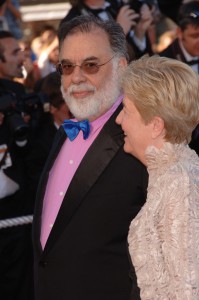Brandon Staglin, the son of vintners Shari and Garen Staglin, said he lives with schizophrenia “but like any significant part of one’s life, it can be a learning experience.”
Brandon, now 37, is the impetus behind this Saturday’s 15th Annual Staglin Family Music Festival for Mental Health. The event, at the family’s Rutherford winery, begins at noon, and it combines wine tasting and rock ‘n roll from Pat Benatar (“Hit Me you’re Your Best Shot) with forums on the latest research on mental health. ( www.music-festival.org.)
Brandon is speaking out about mental illness because of what happened to him in the summer of 1990, when at 18 he felt as though he lost half of himself. He couldn’t sleep for a week and wandered the town of Lafayette, soon picked up by police and later locked in a psychiatric hospital. That’s where his parents found him when they rushed home from a business trip to Paris.
As Brandon puts it, “Many of us feel like we are, or perceived as, somehow ‘less’ than normal. But if your mind is open, believe me, you may find a different way to feel … we who live with brain disease are people like you. I work for a cause I believe in …”
What follows is a Q&A with Brandon, a national merit scholar and future astronautical engineer who was diagnosed with schizophrenia that summer of 1990, which he now manages with medication.
Q: What has hosting this event done for you. When you give, you’re always given back a gift. What is that gift for you?
A: Getting to meet so many people who care about making life better for people with mental illness. It is truly a growing movement and being part of it sometimes makes me feel giddy. I’ve seen a beautiful outpouring of compassion and action for the benefit for people who, like me, have suffered in ways we cannot communicate. And the thing that makes me most proud is to see other people with mental illness who have found the courage to speak out for this purpose, and who have been helped to this decision in part by my family’s efforts. These people who talk about their inner battles publicly to help others in their condition are, in my humble opinion, heroes, and I feel honored to know them.
Q: What is the most fascinating thing you’ve learned from the Scientific Symposium? Why do you encourage people to come for this part of the festival?
A: Get this: Scientists are closing in on a way to prevent a psychotic break altogether, and allow people who would otherwise have had one to bypass years of disability. At last year’s symposium, Dr. Ty Cannon shared with everyone the news that a 5-year project he leads, the North American Prodrome Longitudinal Study, is aiming to give doctors the ability to predict with 80% accuracy that someone who shows certain signs of impending psychosis either will or will not have a psychotic break within a 1-2 year period. Once someone has been predicted as such, they can opt to be treated not only with current psychosocial therapies but with increasingly safe and effective medications such as those being investigated by this year’s symposium speakers, Drs. Francis Lee and Andrew Pieper, and many others. This research is a team effort by dedicated, passionate scientists the world over. People who see these scientists speak can catch some of that passion as they learn from them.
Q: This is your 15th year. What kind of village have you built over the years? What has this music festival done for families and others who face a mental health challenge?
A: Our mailing list has a few thousand people who follow what we do. I myself have made a few friends who live with mental illness, who are wonderful people. And I hear from many people who come to this and other mental health events that they have been inspired toward hope for themselves, knowing that funds are being raised, that research is making breakthroughs, and that more and more people care about helping people with mental illness. As people and families with mental illness share stories at the Music Festival they learn that they are not alone in their plight, and that some of us are on the road to recovery. But not only has the festival helped build hope, it has helped develop tangible new therapies such as the cognitive training programs under development at UCSF for people with schizophrenia. Under Dr. Sophia Vinogradov’s guidance, these have improved the ability of people with schizophrenia to think clearly and are under review for FDA approval as standard medicine. That program helped me get better.
Q: Why a concert? Why mix in good rock n roll?
A: People love it! It’s a celebration of life. Dancing to great music is top-notch therapy for anyone and brings people together. At last year’s concert with the Pointer Sisters, the love and joy that you could feel in the crowd was awesome. Not only is feeling this connection great for the soul of those attending, but it helps motivate people to give to others, to help them feel a bit more joy as well.
Q: Regarding mental health, what is the most hopeful aspect about it today?
A: The fact that stigma is slowly being eliminated. Young people in college talk openly about mental disorders the way they might talk about a broken leg or diabetes. People are understanding that mental illnesses are brain diseases, and someone who has one deserves support and medical therapy, not shame. And, with the mental health parity act passed in Congress last year (and more legislation on the way) insurance companies can no longer limit support for people who have mental diseases. If you know someone with a mental illness, or have one yourself, be kind—give help or seek help! It’s getting easier to find all the time.





